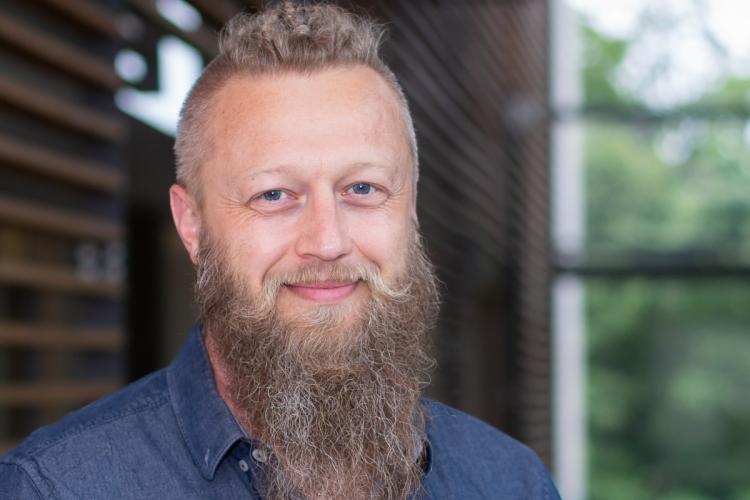Queen's computational neuroscientist discusses major, new research into the human-technology relationship and its potential benefits and risks.

Gunnar Blohm, a professor and researcher at the Centre for Neuroscience Studies, is leading the Queen's portion of the Connected Minds project. (Queen's University)
The Government of Canada announced new funding recently in support of a major, new multidisciplinary research initiative being led by York University and supported by Queen's. The seven-year project - called Connected Minds: Neural and Machine Systems for a Healthy, Just Society - received over $105 million from the Canada First Research Excellence Fund (CFREF) to assess the potential risks and benefits of technology for humanity. Queen's is set to receive $22.8 million of the federal funds.
Leading the Queen's portion of the project is Connected Minds' Vice-Director, Gunnar Blohm, a computational neuroscientist with the university's Centre for Neuroscience Studies. He's set to contribute administrative, teaching, and research expertise to the venture, which seeks to explore the ever-deepening relationship between humans and disruptive technologies.
"In my field of study, we create mathematical models, use artificial intelligence, and design computer simulations to gain insights into the mechanics of brain function and motor control," says Dr. Blohm. "Within this project, I'm particularly excited to look at the emerging behaviours of networks, whether these are networks of neurons within the human brain, networks of people, or networks between people and technological devices. Insights we gain here could help us understand how to improve technology for the benefit of society while limiting its potential for harm."
To illustrate one way Connected Minds could inform more thoughtful technological development, Dr. Blohm points to Canada's signing of the Organisation for Economic Co-operation and Development's (OECD) Recommendation on Responsible Innovation in Neurotechnology.
"While Canada is a signatory of this agreement, we currently have no guidelines to instruct how we would achieve its goals," he says. "The Queen's Connected Minds team will work toward establishing such guidelines, as they will be crucial in ensuring technological development is done in service of a diverse and equitable global society. It makes good economic sense as well, given that socially responsible technologies are more and more commercially attractive."
Building the project from the ground up
In addition to his research responsibilities, Dr. Blohm is set to coordinate and administer Queen's-based activities - which span the governance, outreach, and commercialization aspects of the project.
"Queen's will be fully integrated into Connected Minds at all levels, and our participating faculty researchers complement York's team with expertise in neuroscience, artificial intelligence, robotics, and neurotechnology, particularly that with a health focus," he says. "As part of phase one, we've created co-leadership roles at all levels of the project, convened a joint York-Queen's Indigenous advisory circle, and now we are working to establish the administrative structure, which includes striking committees, drafting terms of reference, and recruiting new faculty and staff."
In addition to the CFREF investment the project will engage more than 50 community partners and research collaborators, that will see institutional and multi-sector contributions that bring the overall investment in the project to $318.4 million.
Multidisciplinary collaboration and learning
Once underway, Dr. Blohm sees the multidisciplinary nature of the project as pivotal.
"No breakthrough today is achieved by single people. It's always teams - always fields of research working together," he says. "Connected Minds will be a tremendous way for investigators and students to take research to the next level."
CFREF funding has allowed Queen's to commit to hiring nine tenure-track faculty positions and support for 50 graduate trainees and 27 postdoctoral fellows.
"There will be a range of opportunities for the wider Queen's community to get involved," says Dr. Blohm. "These include trainee funding, large group grants, commercialization funds, and educational initiatives. It's truly an exciting time for Queen's, for York, and for Canada."
As a passionate educator, he sees Connected Minds changing the way we innovate, teach, and live, and is determined that these changes help not only Canadians, but everyone around the world.
"One of my goals is to democratize access to knowledge and education," says Dr. Blohm, who co-created Neuromatch Academy - a worldwide training program that provides equitable access to computational neuroscience training to students regardless of geography, nationality, socioeconomic status, or other factors. "Connected Minds has partnered with Neuromatch on elements of this project, which I believe will accelerate our initiatives to expand access to learning."










